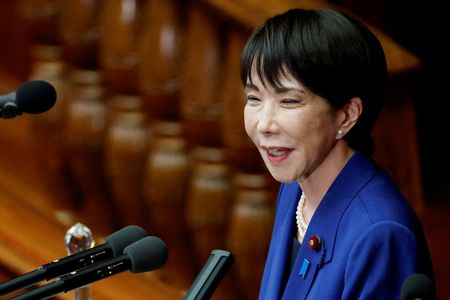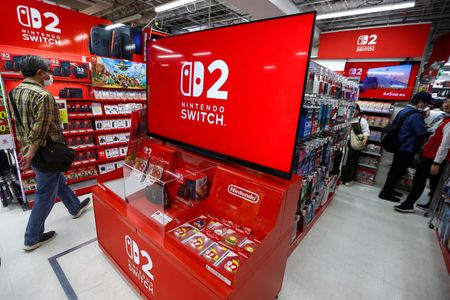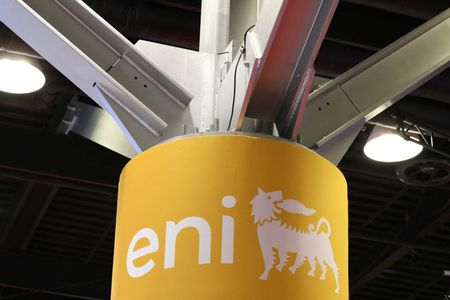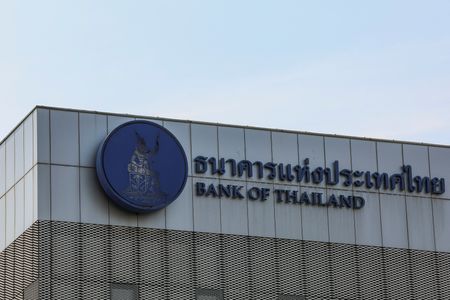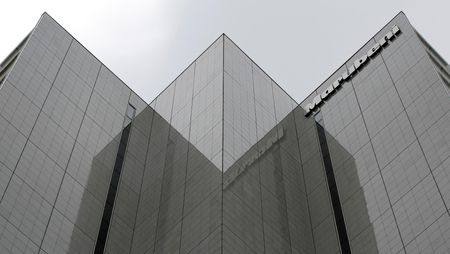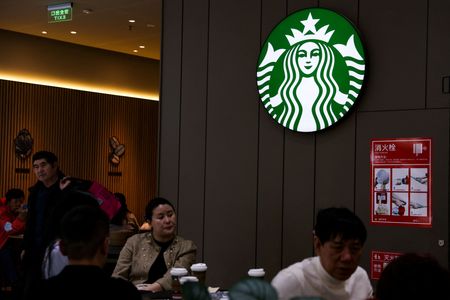By Leika Kihara
TOKYO (Reuters) -Japanese Prime Minister Sanae Takaichi said on Tuesday the country has yet to achieve sustainable inflation accompanied by wage gains, signaling her preference for the central bank to go slow in raising interest rates.
While consumer inflation continues to hover around 3% due to rising food costs, Japan is still “half way” in achieving sustainable and stable price growth backed by solid wage gains, Takaichi told parliament.
“I hope the Bank of Japan conducts appropriate monetary policy towards sustainably and stably achieving its 2% inflation target,” said Takaichi, who has advocated expansionary fiscal and monetary policy.
She was questioned by Yoshihiko Noda, head of the largest opposition party and a former prime minister, who said preventing the BOJ from raising interest rates could push up import costs and inflation more broadly by weakening the yen.
Takaichi also said her administration will “strategically” deploy fiscal spending to increase household incomes, improve consumer sentiment and strengthen the economy.
She voiced caution about lowering Japan’s consumption tax rate – an idea proposed by some opposition parties, saying there were several challenges such as time needed by retailers to adjust their equipment to a new rate.
Takaichi’s remarks on monetary policy may affect the BOJ’s decision on whether to resume rate hikes as soon as its next meeting on December 18-19, as some market players predict.
BOJ Governor Kazuo Ueda is scheduled to deliver a speech and hold a news conference in Nagoya, central Japan, on December 1, where he could drop hints on the likelihood of a near-term hike.
The BOJ ended a massive, decade-long stimulus last year and raised interest rates to 0.5% in January on the view Japan was on the cusp of sustainably achieving its 2% inflation target.
It has kept rates steady since then, including at last week’s policy meeting, to ensure Japan makes further progress in durably hitting its price goal backed by solid wage gains.
Critics blame the slow pace of BOJ rate hikes as having helped weaken the yen and push up import costs, thereby keeping inflation above its 2% target for well over three years.
In a news conference after last week’s policy meeting, Ueda said the likelihood of the BOJ’s baseline projection materialising has “heightened somewhat,” sending the strongest signal yet that a rate hike was possible as soon as December.
But the yen slumped as Ueda’s comments were not as strong as some market participants had expected. That led to Japan’s finance minister warning against excessive declines in the currency.
Japan’s core consumer prices rose 2.9% year-on-year in September. While nominal wages have risen due to a tight job market, stubbornly high costs of living have weighed on consumption.
Analysts also expect higher U.S. tariffs to start hurting exports with some projecting Japan’s economy to suffer a deep contraction in the third quarter.
(Reporting by Leika Kihara; Editing by Sam Holmes and Edwina Gibbs)

